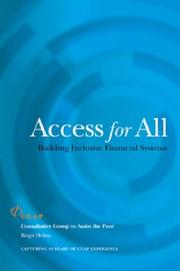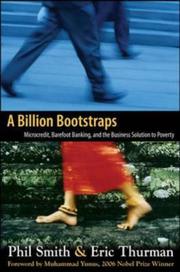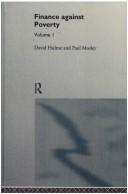| Listing 1 - 10 of 24 | << page >> |
Sort by
|
Book
ISBN: 9782807600911 2807600921 2807600948 2807600913 280760093X Year: 2016 Publisher: Brussels, Belgium : P.I.E. Peter Lang,
Abstract | Keywords | Export | Availability | Bookmark
 Loading...
Loading...Choose an application
- Reference Manager
- EndNote
- RefWorks (Direct export to RefWorks)
A school of thought hails microcredit as a social innovation, a messiah to enable people to help themselves out of poverty through entrepreneurship. An opposing school of thought considers microcredit as a capitalist demon ensnaring the poor in poverty and debt. The layman and the million professionals working in this industry are at a loss to make sense of the stories that circulate about microcredit. This book provides this sense-making, useful for students, professionals, investors and researchers who are attracted to this field. Poverty is a wicked problem, akin to Hydra, the Greek mythological monster with many heads. As microcredit tries to balance multiple objectives to grapple with these multiple heads, it has needed to shift the weapons it uses. The arsenal for this battle has needed new philosophies, changing ethics, differing missions, institutional partnerships, the latest technologies and new products. These rapid innovations have differed in speed across the world, with adaptations in developed and developing countries. This book presents these with many case studies and field research. It is clear that development initiatives, no matter how financial, cross academic disciplines. At the very least, they affect disciplines such as economics, business management, sociology, history, geography, politics, legal systems in place, as well as science, which is evolving at such a high speed. The book provides this multidisciplinary view and motivates future research and practices. «For anyone who is interested in research in this field, no doubt this will be a very stimulating reading.» (Marc Labie, Strategic Change 26(6) 2017)
Microfinance --- Microfinance. --- Micro-finance --- Microcredit --- Microenterprise lending --- Microlending --- Financial services industry --- Small business --- Finance
Book
ISBN: 0821382284 9780821382288 9780821382356 0821382357 9786612657443 1282657445 Year: 2010 Publisher: Washington, D.C. : World Bank,
Abstract | Keywords | Export | Availability | Bookmark
 Loading...
Loading...Choose an application
- Reference Manager
- EndNote
- RefWorks (Direct export to RefWorks)
In its new and developing role as a "knowledge bank," the World Bank can offer its clients much more than new financing (loans, guarantees or grants). It can also offer access to recent developments in international best practices, provide new knowledge sharing opportunities and facilitate the exchange of new ideas in a variety of fields. It can also use this new capacity to help local institutions address strategic and operational challenges. To that end, this book brings together the results of an eight-part series of presentations by leading experts and microfinance practitioners on issues
Microfinance. --- Risk management. --- Microfinance --- Risk management --- LDC / Developping Countries - Pays En Développement --- AA / International- internationaal --- 333.714 --- ambachtskrediet, beroepskrediet en volkskrediet. --- Micro-finance --- Microcredit --- Microenterprise lending --- Microlending --- Insurance --- Management --- Financial services industry --- Small business --- Finance --- ambachtskrediet, beroepskrediet en volkskrediet
Multi
ISBN: 9781783603756 9781783603749 9781783603763 9781783603770 9781783603787 1783603763 1350250937 Year: 2015 Publisher: London Zed Books
Abstract | Keywords | Export | Availability | Bookmark
 Loading...
Loading...Choose an application
- Reference Manager
- EndNote
- RefWorks (Direct export to RefWorks)
An important volume that examines the highly contested subject of microcredit, showing how its increasing inefficiency and sub-prime nature has resulted in multiple crises. Microcredit programmes, long considered efficient development tools, now face unprecedented crises in a number of countries. Is this the end of microcredit or rather an essential step in its expansion? Should we stop microcredit altogether or rethink the way it is implemented? Drawing on extensive empirical research conducted in various parts of the world - from Morocco to Senegal to India - this important volume examines the whole chain of microcredit to provide the answers to these questions. In doing so, the authors highlight the diversity of crises, both in intensity and in nature, while also shedding light on a diversity of causes, be it microcredit organizations unprepared for massive growth, saturated local economies or greedy investors and shareholders attracted by profits. Crucially, the authors demonstrate that microcredit is not a monolithic project, and the crises should also be analysed in the light of national histories and policies. An original and necessary intervention in what has become one of the most contentious topics within the development world.--Publisher website.
Private finance --- Developing countries --- Microfinance --- Micro-finance --- Microcredit --- Microenterprise lending --- Microlending --- Financial services industry --- Small business --- Finance --- E-books --- Microfinance. --- Poverty. --- Destitution --- Wealth --- Basic needs --- Begging --- Poor --- Subsistence economy --- Development economics & emerging economies --- Poverty & unemployment
Book
ISBN: 9780415375320 9780203882764 0415375320 0203882768 9781134187034 9781134187072 9781134187089 9780415596909 Year: 2009 Publisher: London Routledge
Abstract | Keywords | Export | Availability | Bookmark
 Loading...
Loading...Choose an application
- Reference Manager
- EndNote
- RefWorks (Direct export to RefWorks)
AA / International- internationaal --- 333.130.0 --- 333.134 --- 333.714 --- 338.340 --- Private banken: algemeen. Studies over de organisatie en de techniek van de banken --- Volksbanken. --- ambachtskrediet, beroepskrediet en volkskrediet. --- Algemene ontwikkeling in de Derde Wereld. --- Microfinance --- Micro-finance --- Microcredit --- Microenterprise lending --- Microlending --- Financial services industry --- Small business --- Volksbanken --- ambachtskrediet, beroepskrediet en volkskrediet --- Algemene ontwikkeling in de Derde Wereld --- Finance --- Private finance --- Microfinance.

ISBN: 0821363603 0821363611 9780821363607 9780821363614 9786610305278 1280305274 Year: 2006 Publisher: Washington, DC : World Bank,
Abstract | Keywords | Export | Availability | Bookmark
 Loading...
Loading...Choose an application
- Reference Manager
- EndNote
- RefWorks (Direct export to RefWorks)
In the past ten years, the world of microfinance has changed dramatically. The field has moved rapidly from early innovations in providing loans to help poor entrepreneurs start businesses to a bold vision of creating entire financial systems that work for the poor. Microfinance has proven to be an effective tool for reducing poverty and helping poor people to improve their lives. And yet a diverse range of potential clients still lack access to an array of financial services - not just credit for enterprise but also a safe place to save, the ability to transfer funds to family members, insura
Social policy --- Private finance --- Third World: economic development problems --- Developing countries --- Microfinance --- Credit --- Financial institutions --- Financial services industry --- Poor --- Crédit --- Institutions financières --- Services financiers --- Pauvres --- Government policy --- Micro-finance --- Microcredit --- Microenterprise lending --- Microlending --- Small business --- Services, Financial --- Service industries --- Finance
Book
ISBN: 9789814295659 9814295655 9814295663 9786613234643 1283234645 9789814295666 Year: 2011 Publisher: London World Scientific
Abstract | Keywords | Export | Availability | Bookmark
 Loading...
Loading...Choose an application
- Reference Manager
- EndNote
- RefWorks (Direct export to RefWorks)
The Handbook of Microfinance gathers selected work from academics and field practitioners. In an attempt to understand the enormous gap between the limited number of clients that are currently benefiting from microfinance services, and the huge number of potential clients that are not, the selected contributions in this handbook have one common tread: the prevailing mismatch between demand by clients of microfinance institutions and potential clients selecting themselves out for their demand for a wider array of financial products is not being met. The scope of the book is wide. It includes su
Private finance --- Developing countries --- Microfinance. --- Microfinance --- LDC / Developping Countries - Pays En Développement --- AA / International- internationaal --- 333.714 --- 333.134 --- 338.340 --- sociale economie --- welvaartseconomie --- 14.01 --- ambachtskrediet, beroepskrediet en volkskrediet. --- Volksbanken. --- Algemene ontwikkeling in de Derde Wereld. --- Microfinanciering en -verzekeringen ; Algemeen --- Micro-finance --- Microcredit --- Microenterprise lending --- Microlending --- Financial services industry --- Small business --- Volksbanken --- ambachtskrediet, beroepskrediet en volkskrediet --- Algemene ontwikkeling in de Derde Wereld --- Finance --- E-books --- Aide économique

ISBN: 9780071489973 0071489975 Year: 2007 Publisher: New York McGraw-Hill
Abstract | Keywords | Export | Availability | Bookmark
 Loading...
Loading...Choose an application
- Reference Manager
- EndNote
- RefWorks (Direct export to RefWorks)
Microfinance. --- Loans, Personal. --- Poverty. --- Microfinance --- Prêts personnels --- Pauvreté --- 336.71 --- 336.77 --- 339.96 --- Bankwezen --- Financiering. Krediet. Kredietverlening. --- Ontwikkelingshulp. Ontwikkelingssamenwerking. Ontwikkelingsproblematiek --- 339.96 Ontwikkelingshulp. Ontwikkelingssamenwerking. Ontwikkelingsproblematiek --- 336.77 Financiering. Krediet. Kredietverlening. --- 336.71 Bankwezen --- Prêts personnels --- Pauvreté --- Loans, Personal --- Poverty --- Destitution --- Wealth --- Basic needs --- Begging --- Poor --- Subsistence economy --- Micro-finance --- Microcredit --- Microenterprise lending --- Microlending --- Financial services industry --- Small business --- Consumer loans --- Loans, Consumer --- Loans, Small --- Personal loans --- Small loans --- Consumer credit --- Loans --- Financiering. Krediet. Kredietverlening --- Finance
Book
ISBN: 9781848441941 1848441940 Year: 2010 Publisher: Cheltenham : Edward Elgar,
Abstract | Keywords | Export | Availability | Bookmark
 Loading...
Loading...Choose an application
- Reference Manager
- EndNote
- RefWorks (Direct export to RefWorks)
Microfinance --- France --- Italie --- Bulgarie --- Allemagne --- Hongrie --- Danemark --- Portugal --- Autriche --- Slovaquie --- Luxembourg --- Norvège --- Belgique --- Espagne --- Roumanie --- Pologne --- Suède --- Pays-Bas --- Kreditwesen --- Mikrofinanzierung --- Unternehmensentwicklung --- Kreditwesen. --- Mikrofinanzierung. --- Unternehmensentwicklung. --- France. --- Italie. --- Bulgarie. --- Allemagne. --- Hongrie. --- Danemark. --- Portugal. --- Autriche. --- Slovaquie. --- Luxembourg. --- Norvège. --- Belgique. --- Espagne. --- Roumanie. --- Pologne. --- Suède. --- Pays-Bas. --- 330.55 --- 333.714 --- EEC / European Union - EU -Europese Unie - Union Européenne - UE --- Micro-finance --- Microcredit --- Microenterprise lending --- Microlending --- Financial services industry --- Small business --- Coöperatief stelsel --- ambachtskrediet, beroepskrediet en volkskrediet --- Finance --- Norvège. --- Suède.
Book
ISBN: 0060406569 Year: 1975 Publisher: New York Harper & Row
Abstract | Keywords | Export | Availability | Bookmark
 Loading...
Loading...Choose an application
- Reference Manager
- EndNote
- RefWorks (Direct export to RefWorks)
AA / International- internationaal --- 333.401 --- 330.00 --- 333.400 --- Begrip en functies van het geld. --- Economische en sociale theorieën: algemeenheden. --- Geldwezen: algemeenheden. --- Economics --- Financial institutions --- Money --- Currency --- Monetary question --- Money, Primitive --- Specie --- Standard of value --- Financial intermediaries --- Lending institutions --- Economic theory --- Political economy --- Economische en sociale theorieën: algemeenheden --- Geldwezen: algemeenheden --- Begrip en functies van het geld --- Exchange --- Finance --- Value --- Banks and banking --- Coinage --- Currency question --- Gold --- Silver --- Silver question --- Wealth --- Associations, institutions, etc. --- Social sciences --- Economic man

ISBN: 0415095441 0415124298 041512431X 0415124301 9786610170869 0203980131 1280170867 1134803850 9786610288861 1134803788 1280288868 0203978927 9780415124300 9781134803781 9781280288869 9780203980132 9780203978924 9781134803736 9781134803774 9780415124317 9781134803804 9781134803842 9781134803859 9780415095440 9780415124294 113480377X 1134803842 Year: 1996 Publisher: London ; New York : Routledge,
Abstract | Keywords | Export | Availability | Bookmark
 Loading...
Loading...Choose an application
- Reference Manager
- EndNote
- RefWorks (Direct export to RefWorks)
Over the last decade, the theory that poverty in the world's poorest regions could be alleviated by providing small loans to micro-entrepreneurs has become increasingly popular. This volume examines the effectiveness of this theory when put into practice. The book presents empirical evidence drawn from comparative experiences in seven developing countries and produces some startling conclusions. This work should be essential reading for all those interested in development, poverty-reduction, social welfare and finance. Volume One provides a detailed analysis of this theory an
Private finance --- Development aid. Development cooperation --- Developing countries --- Poverty --- Finance --- Economic development --- Pauvreté --- Finances --- Développement économique --- Debt financing (Corporations). --- Public welfare. --- Business. --- 330.56 --- 336.7 --- Nationaal inkomen. Volksinkomen. Gezinsinkomen. Vermogensstratificatie. Particuliere inkomens en bestedingen. Armoede. Honger --- Geldwezen. Kredietwezen. Bankwezen. Financien. Monetaire econonomie. Beurswezen --- 336.7 Geldwezen. Kredietwezen. Bankwezen. Financien. Monetaire econonomie. Beurswezen --- 330.56 Nationaal inkomen. Volksinkomen. Gezinsinkomen. Vermogensstratificatie. Particuliere inkomens en bestedingen. Armoede. Honger --- Debt financing (Corporations) --- Economic conditions. --- Pauvreté --- Développement économique --- Economic policy. --- Corporations --- Corporate debt --- Poverty - Developing countries. --- Business & Economics --- Economic History --- Entrepreneurship. --- Finance. --- Government lending. --- Political aspects. --- Poverty. --- average --- loan --- size --- grameen --- bank --- rural --- credit --- market --- financial --- institutions
| Listing 1 - 10 of 24 | << page >> |
Sort by
|

 Search
Search Feedback
Feedback About UniCat
About UniCat  Help
Help News
News